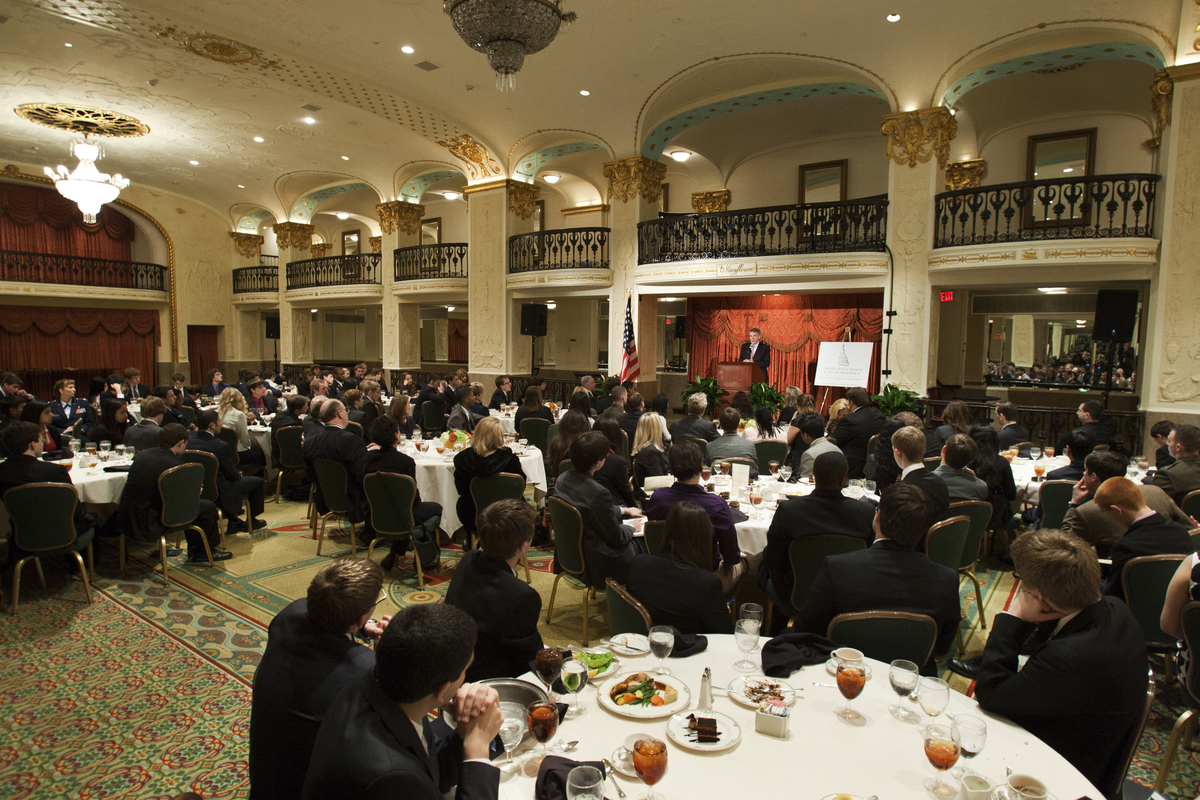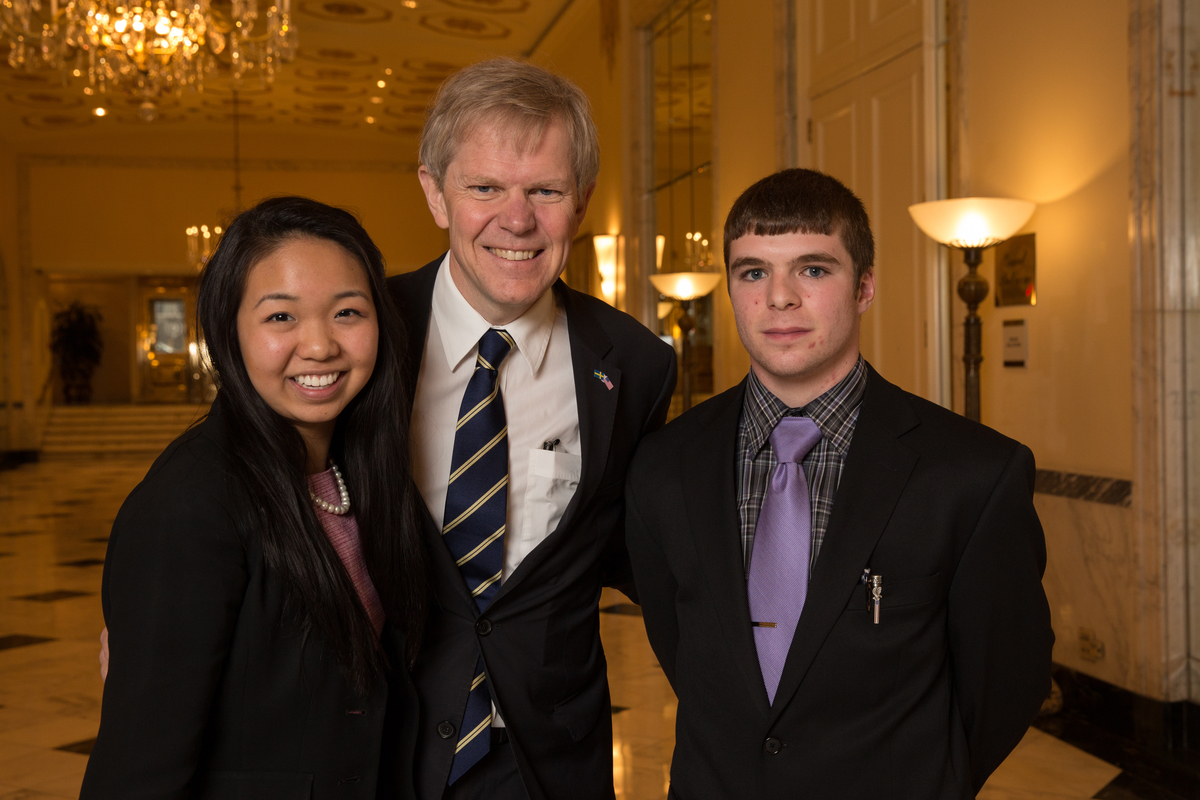Have you ever considered a career in diplomacy? Many Senate Youth delegates are passionate about international relations, so it is a cherished Washington Week tradition to welcome Washington’s diplomatic elite at the Annual Ambassador Luncheon.
Invariably the Ambassadors offer delegates a deeper perspective on international affairs, foreign policy and America itself. In addition to providing an overview of their home countries’ politics, history and culture, the Ambassadors also share personal wisdom and advice and describe their paths to public service in the diplomatic corps.
Ambassador Bjorn Lyrvall of Sweden touched on all of these themes in his 2015 address. He spoke about the importance of longevity in relationships, noting that Sweden enjoys one of the longest diplomatic relationships that the United States has had with any nation – a partnership established in the days after the end of the Revolutionary War.
Nelson Mandela’s spirit and legacy was brought to life by First Secretary Aluwani Museisi of South Africa who addressed the delegates in 2014, several months after President Mandela’s death. Secretary Museisi spoke eloquently of how forgiveness and the power of education has led to South Africa’s transformation, and inspired all in the audience with his belief that “a brighter future beckons.”
At the 2013 Ambassador Lunch address, His Excellency Kenichiro Sasae of Japan defined the U.S. – Japan relationship cogently, “We have each other’s backs.” Operation Tomodachi (meaning ‘friendship’ in Japanese) was fresh in his mind at the luncheon, describing America’s humanitarian and military response to Japan’s devastating Fukushima earthquake and tsunami that occurred two years earlier.
For the 50th Anniversary of USSYP in 2012, the United Kingdom’s Ambassador Sir Peter Westmacott spoke about building and maintaining relationships – emphasizing the human contact that can overcome the endless 24-hour news cycle and the cynicism that it may engender.
In 2011, Former Turkish Ambassador Namik Tan reflected on his nation at the nexus of Asia, Europe and Africa, and admired what he described as a quality unique to the U.S., “America is the only country on the face of the Earth, where once you step in, you do not feel like you are a foreigner,” he said.
These international leaders all offered heartfelt invitations for delegates to come experience their homelands firsthand. We remember their humor, graciousness and dedication to peace and diplomatic relations. Delegates have benefited from their wisdom and inspiration – and some have followed their footsteps with careers in international relations or the State Department.
Here is an in-depth look at the past five years of United States Senate Youth Program Ambassador Luncheon speakers.
2015: Swedish Ambassador Bjorn Lyrvall embodies humanitarianism, public service
The affable and understated Swedish Ambassador to the United States quickly built a strong rapport with his audience at the annual USSYP Ambassador Luncheon. Bjorn Lyrvall of Sweden began by reminiscing about the high school exchange program that brought him to New Wilmington, Pennsylvania many years ago. “It was a great American experience, with homecoming and the prom, with evenings driving around with my friends in a four wheel drive Chevy truck in beautiful Amish country, and playing the Star Spangled Banner in the high school band.”
Thus began a lifelong affection for the United States for the ambassador who relayed some history between Sweden and the U.S, starting with his nation as one of the first to recognize the post-Revolutionary War United States. Benjamin Franklin and his Swedish diplomatic counterpart, Gustaf Philip Cruetz, signed a Treaty of Amity and Commerce in 1783 which still stands in effect. Other strong factors in the U.S. – Sweden relationship include a large wave of Swedish immigration during the late 1800s and early 1900s when approximately one fourth of the Swedish population immigrated to the United States due to poverty, resulting in a large number of Americans with Swedish ancestry today. As Ambassador Lyrvall noted, most people in Sweden, including himself, have someone in the family who emigrated to the U.S.
As a nation, Sweden holds the core values of openness and transparency, and shares with America the identity of “Being a place and a refuge for people fleeing persecution and oppression.” He provided evidence of his nation’s achievements, as a global leader in the arts, technology, diplomacy and commerce. Citing Volvo and Ikea as more obvious examples, he also pointed out that Spotify, Skype, Candy Crush Saga and MineCraft are all Swedish companies, and that Sweden was rated as having the second highest standard of living in the world, based on the most recent Organization for Economic Cooperation and Development survey. The students also learned that Sweden is the third-largest exporter of pop music after the United States and the United Kingdom, and that music and technological innovations may stem from the long, dark Nordic winters fostering lots of creativity.
Ambassador Lyrvall also discussed progressive Swedish policy initiatives, relaying the facts that Sweden has cut greenhouse emissions by 20% since 1990 while still growing its economy by 60%, and that Sweden is making strides in breaking the glass ceiling for women, with 50% of the Cabinet, 45% of Parliament, and 38% of its ambassadors being female. One of the largest donors of foreign aid in the world, at slightly more than one percent of its Gross Domestic Product, the ambassador noted the philosophy that fuels this aid is more than altruism, “This is not only beneficial from a quality of life perspective for those in developing nations,” he said, “Poverty feeds instability; it feeds conflict.”
Ambassador Lyrvall knew to expect many questions from such a global-minded audience and he graciously gave of his time to share his thoughts on Swedish educational policies and subsidized college education, diplomatic relations with North Korea, compulsory military service and the political tensions in the Ukraine. His parting words of inspiration reminded the delegates of the centuries-old friendship between Sweden and America, “We need to stand united, and we need the United States to keep leading the global efforts of the free world. We need it today and we need it tomorrow, when you might be the leaders of this great country.”
2014: Aluwani Museisi, South Africa’s First Secretary, reflects on the life of Nelson Mandela
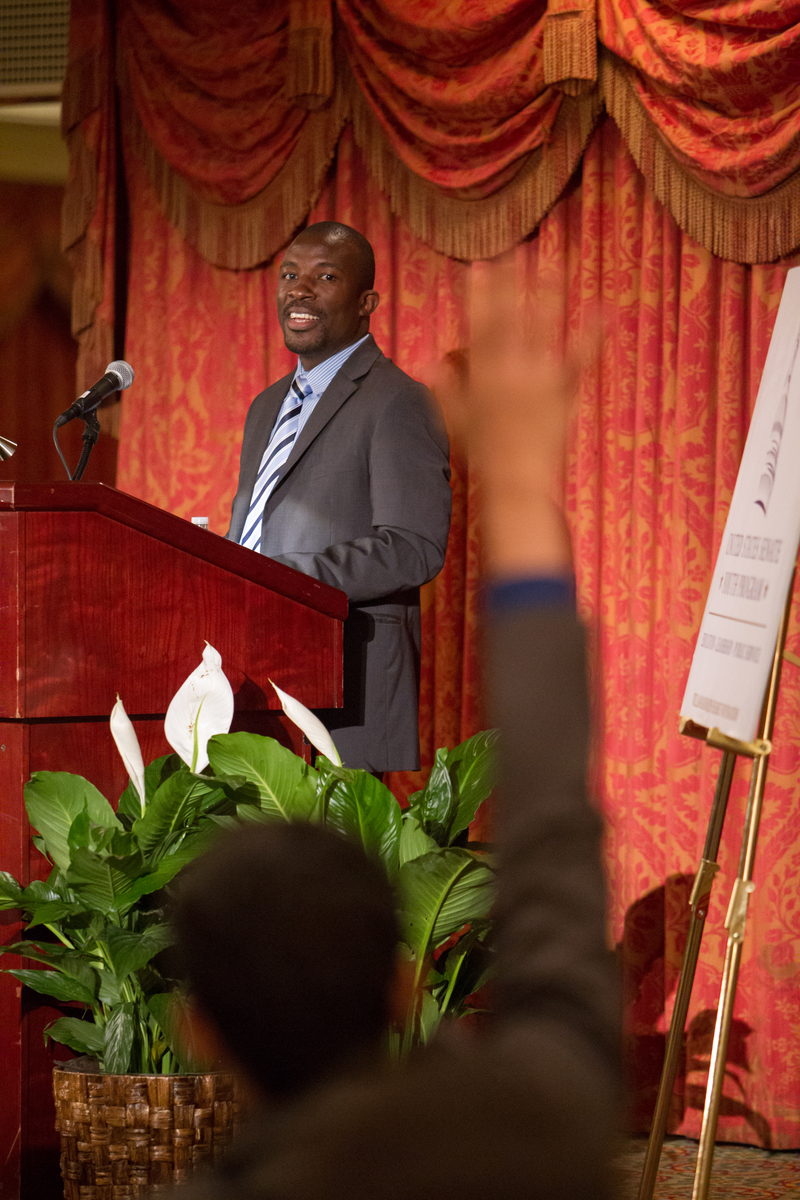
Nelson Mandela’s death in December 2013 evoked worldwide commendation of the life of one who exemplified leadership, courage and service to humanity in the face of seemingly insurmountable obstacles. South African diplomat, First Secretary Aluwani Museisi of South Africa’s Embassy in Washington came before the delegates to commemorate the former President of the Rainbow Nation, and to impart lessons gleaned from Mandela’s life and words for the audience of young people deeply committed to serving the common good.
Mr. Museisi shared how Nelson Mandela had given up what could have been a comfortable life to fight against intransigent injustice. Twenty-seven years in prison did not diminish his abiding belief in the cause of equity and equality for all. For Mr. Mandela, education was a key in overturning years of inequality, as he said, “Education is the great engine of personal development. It is through education that the daughter of a peasant can become a doctor, the son of a mineworker can become the head of the mine, and a child of a farmworker can become the president of a great nation. It is what we make out of what we have, not what we are given that separates one person from another.”
Mandela fought to better the lives of all Africans with the global view that “South Africa cannot be an island of prosperity in a sea of poverty.” Critically, after emerging victorious in the creation of a new nation, when he could have sought revenge and retribution, perhaps Mr. Mandela’s greatest legacy is that he chose forgiveness.
That was, as Mr. Museisi said, “The path less travelled. Nelson Mandela showed South Africa, and ultimately the world, that reconciliation is better than retribution. When he stepped out of that prison, the majority of Africans said, ‘Give me a gun, Mandela. I will die for you.’ He responded by courage, that only true leadership can have. He responded by leading people towards peace. In a time when the chief decisions were taken based on polls, if he had succumbed to the request for war, it would have been understandable. However, this was not the leadership Mr. Mandela espoused. He was not a leader for convenience.”
Mr. Museisi shared his personal story with the students describing his background in economics and love for diplomatic work. “After all, if we are all to coexist in peace and prosperity, we need to communicate effectively and find solutions to our common challenges,” he said.
The delegates were rife with questions: whether the racial inequalities of the past have been truly addressed in South Africa today if he felt that lessons learned in forging peace in South Africa could be applied to the conflict in the Middle East or elsewhere, and questions about water scarcity and other environmental issues.
One student posed the thought that the United States is an opposite reflection of South Africa’s “island of prosperity in a sea of poverty.” Could America’s urban areas be islands of poverty in a sea of prosperity? (Full video of this presentation is available on the USSYP website: www.ussenateyouth.org).
Mr. Museisi, touted South Africa’s beautiful cultural and environmental treasures encouraging the delegates to visit, and closed by reminding the students of Nelson Mandela’s call to young people everywhere, “A brighter future beckons. The onus is on us, through hard work, honesty and integrity, to reach for the stars.”
2013: Ambassador Kenichiro Sasae of Japan Highlights Mutual Respect and Friendship
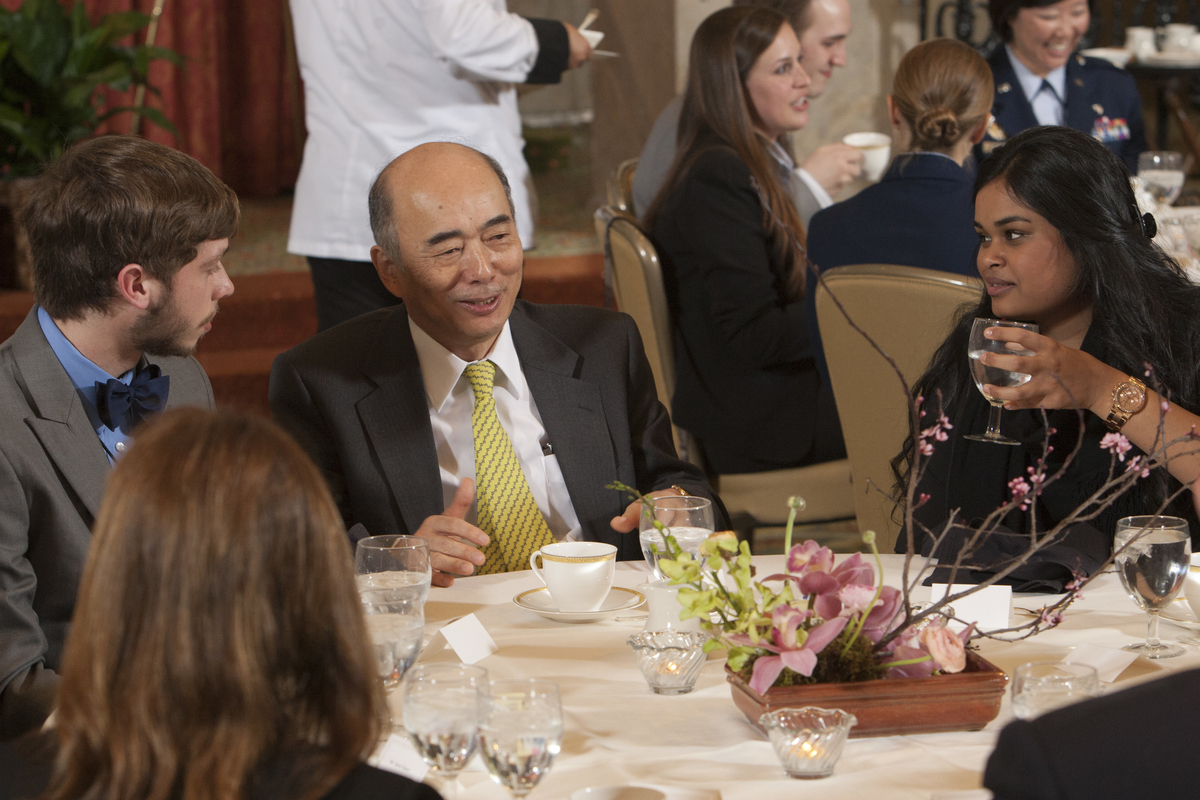
“What do I mean when I say Japan and the United States have an alliance? To use American vernacular, we have each other’s backs, you know?” smiled His Excellency Kenichiro Sasae the newly received Ambassador of Japan to the United States at the 51st annual U.S. Senate Youth Program Ambassador lunch.
Ambassador Sasae spoke movingly about the United States’ response to the Great East Japan Earthquake and Tsunami of March 2011, “The word ‘tomodachi’ in Japanese means friendship. U.S. military support during Operation Tomodachi is a testament to our alliance, and it is a kindness Japan will never forget – I will never forget in my life.” He described a most touching moment amid the destruction and the chaos of that event, “When the American military personnel left in their helicopters from Sendai Airport, which had been under water and clogged with debris, they looked down from the air and noticed someone had spelled out — on the beach with logs and pine trees and driftwood — they spelled the word, “arigato,” which means “thank you” in Japanese.”
The Ambassador discussed the mutual bond between the two nations, a friendship symbolized by the 3,000 cherry blossom trees lining the Tidal Basin at the Jefferson Memorial. “The heart of the Japan-U.S. alliance is based on a shared belief in freedom, democracy, the market economy, the rule of law, and respect for human dignity,” he said. “We believe that a world based on these values is more peaceful and also more prosperous.” Ambassador Sasae highlighted the need for economic cooperation between the U.S. and Japan as the center of global growth moves to Asia, “We recognize that the situation in Asia is getting more tense – China is building up its military and is becoming more assertive on the seas, and the North Koreans are shooting missiles and testing nuclear bombs. But whatever happens in the Asia-Pacific, I believe that the strengthening Japan-U.S. alliance is key because we share the values of democracy and liberty.”
Recalling the warm welcome and profound learning experience he had as a high school exchange student in Chillicothe, Missouri, a small Midwestern town know as ‘The Home of Sliced Bread’, Ambassador Sasae encouraged the delegates to consider participating in the Japan Exchange and Teaching program, “The Japanese people will like you, welcome you, and I believe it will be one of the best experiences of your life. You will find you are in a Japanese community that is the equivalent of’ ‘The Home of Sliced Bread’ to me.”
2012: Ambassador Sir Peter Westmacott of the United Kingdom Reflects on History and Partnership
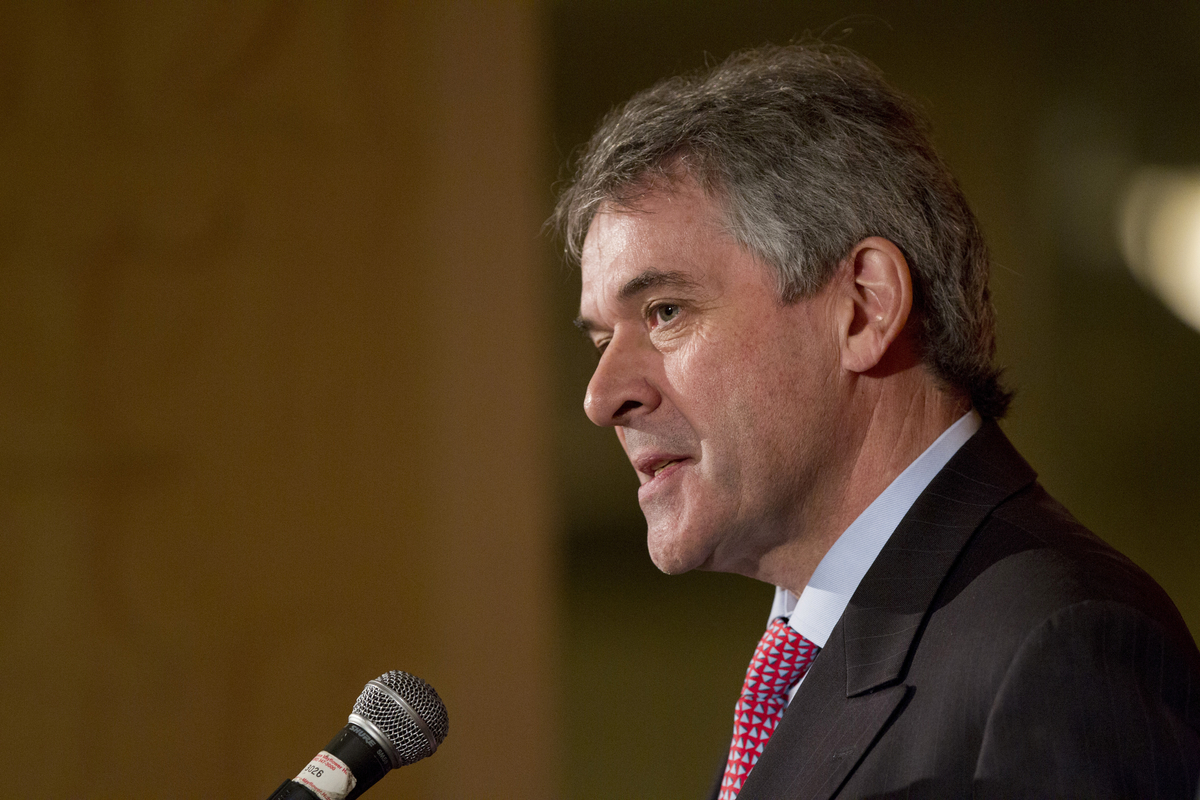
“The life of a diplomat is a lot like a permanent university,” began Sir Peter Westmacott, the United Kingdom’s 48th ambassadorial envoy to the United States. “It is a career of constant change, constant education, constant variety.”
Only a few weeks into his new assignment as Ambassador in Washington, Sir Peter enthusiastically agreed to be the keynote speaker for the annual U.S. Senate Youth Program Ambassador Lunch and spent several hours with the 2012 student delegates describing his fascinating and peripatetic forty years in the British Foreign Service. He pointed to a keen understanding of human relationships and a firm grasp of history as key attributes for success in his field.
Having begun his career in pre-revolution Tehran in the 1970’s, he later went on to become UK Ambassador to Turkey and most recently served as his nation’s Ambassador to France. At a recent farewell dinner in Paris, he recalled a good friend chiding him on the subject of history, saying he hoped Sir Peter had honed his diplomatic skills in France. “I looked at him rather wonderingly as I wasn’t sure what lay behind this question. He said, ‘because, of course, you are about to have to defend the conduct of British soldiers on the 200th anniversary of the War of 1812 when your people burned down the White House.’”
Fluent in Persian, Turkish and French, the Ambassador spoke about the British-American military alliance in Afghanistan as one example of the strong ties between our two nations, “We are partners in so many ways, “he said, “The United States is the biggest foreign investor in the British economy, and the United Kingdom is the biggest foreign investor in the United States economy. And in the area of higher education, we have common standards of excellence and tens of thousands of students from both of our countries enrolled at each other’s institutions of higher learning.”
Ambassador Westmacott outlined other issues of common interest between the U.S. and the UK that he will be working on, including sovereign debt crises in the Euro zone, Britain’s own economic downturn, the Arab Spring, the role of China in the world, Iran and its access to nuclear power and shifting geopolitical power balances with the rise of the BRIC nations.
He conceded that with a 24-hour news cycle and instantaneous global communications that some have questioned the value of on-site Ambassadors in the 21st Century. “For all the relationships that you might have between the principals in capitals, there is still a very important role for people on the spot who are resident. They are movers and shakers who are in the administration who can project the values and describe the policies represented by their country, who know how to negotiate, who have an understanding of the local, political, economic, and other considerations – all of which is key when you are trying to persuade another government to take a certain decision.”
Nonetheless, he said, we do “have to adapt the advice, the analysis, the negotiation, the work that we are doing as diplomats to the rapidity of that news cycle, — If we are too slow, then we are out of a job.” The delegates enjoyed an in-depth Q and A session, including one pointed question asking what is the most prominent issue on which the United States and the United Kingdom disagree? “Well, of course,” the consummate diplomat replied, tongue in cheek, “there’s absolutely nothing on which we disagree.”
2011: Ambassador Namik Tan of Turkey Reflects on His Country at the Nexus of Many Cultures
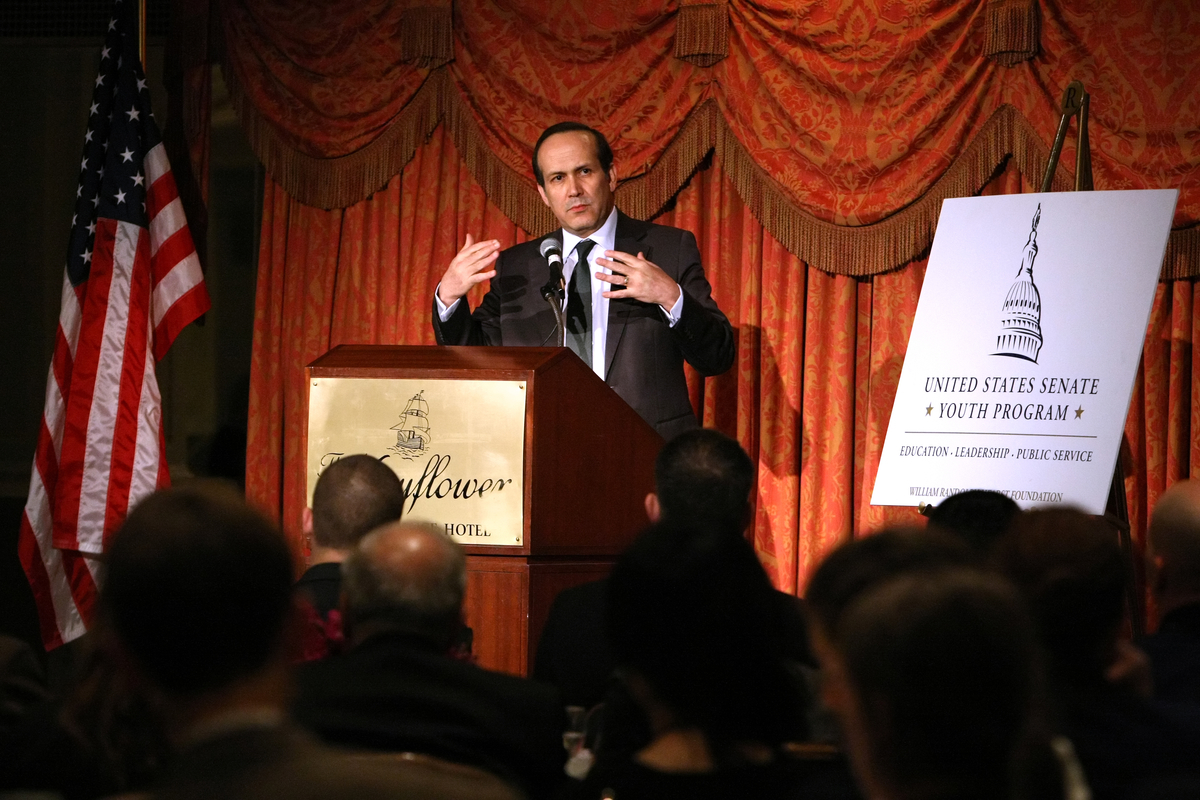
The U.S. Senate Youth Program welcomed His Excellency Ambassador Namik Tan of the Republic of Turkey as keynote speaker for the USSYP annual Ambassador dinner. Addressing the delegates after a Turkish-inspired dinner, Ambassador Tan gave the students a snapshot of modern Turkey in addition to an eloquent invitation to visit his country. “When you come to Turkey you will find world class museums, snow-capped mountains with some of the best ski runs in the world, ancient ruins that tell the story of humankind, unique cuisine, crystal clear seas for swimming or diving, sultans’ palaces that will overcome you with their grandeur, artwork to impress you, culture to inspire you, history to astound you, and people to delight you,” he said.
Noting Turkey’s unique geographical position in the world – the nexus of Asia, Europe and Africa – Ambassador Tan described Turkey as “a beacon of stability, peace, and democracy … we take pride in being a source of inspiration for many beyond our borders,” he said, adding, “as a secular democracy with a predominantly Muslim population, a free market economy and the only country that has a history in both Europe and Middle East, Turkey can and does reach out to different identities in different worlds.”
Ambassador Tan applauded the close bilateral relationship Turkey and the U.S. have shared since the Korean War and expressed his hope that it would deepen and diversify with greater trade and business relations. He cautioned that the U.S. should not let the impact of 9/11 change its unique character of being “the only country on the face of the earth where once you step in, you do not feel like you are a foreigner. It’s a great, great asset and you shouldn’t compromise it.” The Ambassador took a range of questions from the students who avidly sought his thoughts on recent political developments in North Africa and the Middle East, among other topics, providing the students with a fascinating insight into global diplomacy and foreign policy.
